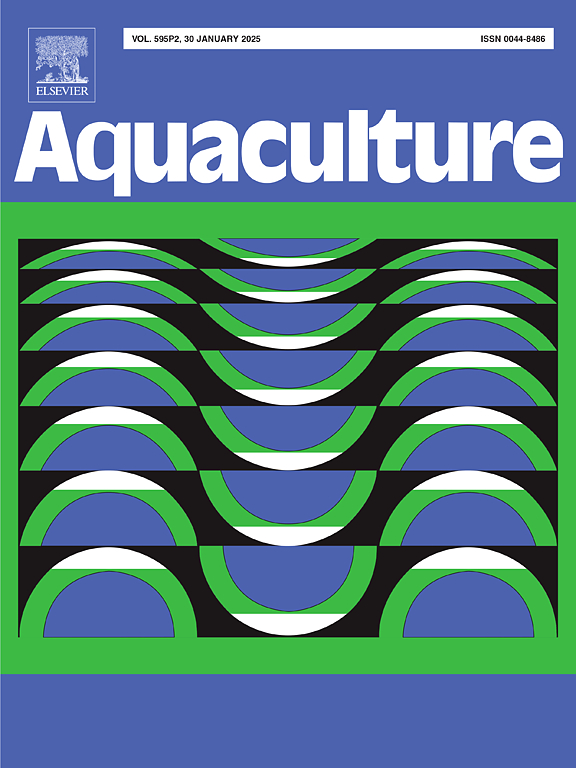急性碱性应激可触发粪鱼肾脏组织病理学、氧化免疫失调和MAPK/TGF-β信号通路激活
IF 3.9
1区 农林科学
Q1 FISHERIES
引用次数: 0
摘要
盐碱水养殖为解决缺水问题和提高水产品产量提供了一种前景广阔的方法。本研究调查了急性碱度胁迫对斑点叉尾鮰(Scatophagus argus)的影响,斑点叉尾鮰是一种以适应各种盐度条件而闻名的物种。我们在两种实验条件下将斑鼬暴露于不同持续时间(0、12、24、48、72 和 96 小时)的碱度应激中:对照组(C),盐度为 30 ‰,碱度为 0 mmol/L;处理组(T),盐度为 30 ‰,碱度为 30 mmol/L。应激暴露后,我们进行了组织学、生物化学和转录组学分析,以评估对肾组织的影响。组织学结果显示,急性碱度胁迫对肾脏造成了严重损害,其特征是肾小管和肾小球的细胞核增大、空泡化和坏死。生化检测显示酶活性发生了改变:超氧化物歧化酶(SOD)和过氧化氢酶(CAT)水平下降,其中 SOD 在 72 小时后略有回升,然后再次下降,表明氧化还原平衡被破坏。与此相反,谷胱甘肽过氧化物酶(GSH-Px)、丙二醛(MDA)、酸性磷酸酶(ACP)和碱性磷酸酶(ALP)的活性随着时间的推移而增加,反映了氧化应激以及代谢和免疫功能的紊乱。转录组分析确定了 247 个差异表达基因(DEG),其中 109 个上调,138 个下调。这些 DEGs 在与免疫反应、细胞粘附和蛋白质折叠相关的通路中明显富集,其中 MAPK 和 TGF-β 信号通路在应激反应中发挥了关键作用。这些结果表明,急性碱度胁迫会诱导银鲫肾脏损伤、破坏免疫和氧化平衡并改变基因表达,从而加深了对盐碱条件下胁迫反应分子机制的理解。本文章由计算机程序翻译,如有差异,请以英文原文为准。
Acute alkalinity stress triggers kidney histopathology, oxidative-immune dysregulation, and MAPK/TGF-β signaling pathways activation in Scatophagus argus
Saline-alkaline water aquaculture offers a promising approach to address water scarcity and increase aquatic product yields. This study investigates the effects of acute alkalinity stress on spotted scat (Scatophagus argus), a species known for its adaptability to various salinity conditions. We exposed S. argus to alkalinity stress for different durations (0, 12, 24, 48, 72, and 96 h) under two experimental conditions: a control group (C) with 30 ‰ salinity and 0 mmol/L alkalinity, and a treatment group (T) with 30 ‰ salinity and 30 mmol/L alkalinity. Following stress exposure, we conducted histological, biochemical, and transcriptomic analyses to assess the impact on kidney tissue. Histological results showed significant kidney damage resulting from acute alkalinity stress, characterized by enlarged nuclei, vacuolization, and necrosis of renal tubules and glomeruli. Biochemical assays revealed altered enzyme activities: levels of superoxide dismutase (SOD) and catalase (CAT) decreased, with SOD exhibiting a slight rebound at 72 h before declining again, indicating a disrupted redox homeostasis. In contrast, the activities of glutathione peroxidase (GSH-Px), malondialdehyde (MDA), acid phosphatase (ACP), and alkaline phosphatase (ALP) increased over time, reflecting oxidative stress and disruptions in metabolic and immune functions. Transcriptomic analysis identified 247 differentially expressed genes (DEGs), with 109 up-regulated and 138 down-regulated. These DEGs were significantly enriched in pathways related to immune response, cell adhesion, and protein folding, with the MAPK and TGF-β signaling pathways playing crucial roles in the stress response. These results suggest that acute alkalinity stress induces kidney damage, disrupts immune and oxidative homeostasis, and alters gene expression in S. argus, providing a deeper understanding of the molecular mechanisms underlying stress responses in saline-alkaline conditions.
求助全文
通过发布文献求助,成功后即可免费获取论文全文。
去求助
来源期刊

Aquaculture
农林科学-海洋与淡水生物学
CiteScore
8.60
自引率
17.80%
发文量
1246
审稿时长
56 days
期刊介绍:
Aquaculture is an international journal for the exploration, improvement and management of all freshwater and marine food resources. It publishes novel and innovative research of world-wide interest on farming of aquatic organisms, which includes finfish, mollusks, crustaceans and aquatic plants for human consumption. Research on ornamentals is not a focus of the Journal. Aquaculture only publishes papers with a clear relevance to improving aquaculture practices or a potential application.
 求助内容:
求助内容: 应助结果提醒方式:
应助结果提醒方式:


